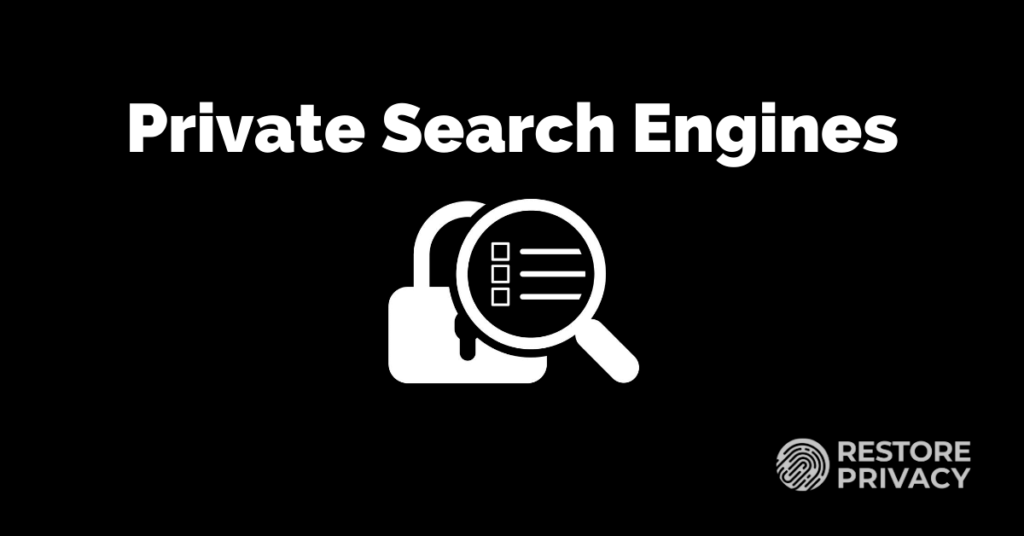
In today’s world, search engines are a necessity to find what you’re looking for online. Unfortunately, however, there are two big problems you will likely encounter:
- Search engines that violate your privacy.
- Search engines that censor search results.
This private search engines guide will thoroughly examine both of these problems and provide you with the best reliable solutions and alternatives we can find. So let’s begin by examining the first problem with search engine privacy.
The search engine privacy problem
Unfortunately, most of the big search engines today serve as data collection tools for advertising companies. That’s right, they collect your private data and use it to make money with targeted ads. This is a booming industry where your data ends up in the hands of third parties and you are the product.
Here is the information being collected by some of the larger (not private) search engines:
- Source IP address
- User agent
- Location
- Unique identifier (stored in browser cookies)
- Search queries
The items you enter into a search engine can disclose highly personal information about you. Things like as medical conditions, employment status, financial information, political beliefs, and other private details. This data can be collected, stored, and linked to detailed digital profiles which can even contain your real identity. The only way to ensure that your data is safe is to keep it out of the hands of the data collectors. To do that, you need to use a private search engine.
Search engine censorship
Many people are getting fed up with online censorship, particularly when trying to find specific information that was previously available. Censorship can take many forms. With search engines today, censorship can come from filtering, manipulating, and/or blocking certain search results from appearing.
Unfortunately, the censorship problem affects many of the private search engines for these two reasons:
- Censorship flows downhill. Many of the alternative and private search engines are nothing more than private proxies that deliver the same search results from the big players. This means that when Google and Bing (Microsoft) engage in censorship and search result manipulation, so will your alternative search engine that delivers those same results.
- Alternative search engines themselves are also engaging in censorship. Recently the CEO of DuckDuckGo announced that they will “down-rank sites associated with Russian disinformation.” We can see both sides to the question of whether or not to engage in censorship given today’s geopolitical events. Nonetheless, this amounts to censorship, which is what many people are trying to avoid.
An exception to this may be with independent search engines that deploy their own crawlers, such as with Mojeek, or Brave Search. Additionally, with Searx, you can select which engines it uses.
So let’s examine some alternative private search engines you can start using today.
The best private search engines
Finding the best private search engine for your needs is a subjective process. Your circumstances and goals are unique, meaning there’s no one-size-fits-all. Things to consider include:
- Where is the service based?
- Where does it get its search results?
- Can you run your own instance?
In a perfect world, a search engine would give you great results while also respecting your privacy. Unfortunately, this isn’t a perfect world. Any of the private search engines in this guide could be the best solution for you. But you will need to test drive the ones that look the best to you to see which is really the best fit. Before we start, there is one issue you need to be aware of:
Metasearch vs search: Most private search engines are technically metasearch engines. While a search engine crawls the internet and gathers its own results, a metasearch engine pulls its search results from other search engines, such as Google, Bing, and Yandex.
There are also a few search engines that fall in the middle by deploying their own crawler, but also pulling results from other search engines.
Here are the best private search engines:
Searx – Open source and uncensored search engine

Jurisdiction: Not applicable (open source, not based in any one location)
Search results: Fully customizable! You can choose from a large selection of engines to display results.
Searx is an open source metasearch engine that gathers results from other search engines while simultaneously respecting your privacy. Even better, you control which search engines Searx pulls results from, as well as specifying the categories for search results.
Searx customizability comes in handy since Google has been known to block Searx requests. We haven’t seen a good solution to the problem, but you can avoid these kinds of problems by telling Searx to avoid Google (or any other source that causes problems).
Searx also allows you to run your own instance of the search engine. The drawback with your own instance, however, is that your search results won’t be mixed with other users. Searx is open source and available on GitHub.
Be careful with public instances
Because Searx is open source and freely available for anyone to use, there are a number of different public instances you can utilize for private searches. However, just like with Tor nodes, anyone with bad intentions can set up a “rogue” instance and potentially log user activity, as Searx explains here:
What are the consequences of using public instances?
If someone uses a public instance, he/she has to trust the administrator of that instance. This means that the user of the public instance does not know whether his/her requests are logged, aggregated and sent or sold to a third party.
Unfortunately, the Searx project does not run an official public instance. They do recommend public instances that are operated by various individuals or entities. But how do you know those instances aren’t logging your search results on their server? You don’t!
For all we know, a public instance might run by an advertising company, or perhaps a domestic or foreign intel agencies, or just some creeps looking to spy on your data. The only way to be sure is to run your own instance.
Searx Github Page >
Searx.space (list of public instances)
Brave Search – A new search engine from the Brave browser

Jurisdiction: United States
Search results: Uses its own crawler!
Brave’s new private search engine, Brave Search, looks very promising. It is brought to you by the makers of Brave, which is a secure browser with built-in privacy that runs on open-source Chromium. Unlike most of the other private search engines in this guide, Brave is using its own search index, rather than relying on Bing or Google.
Here is a brief overview of the Brave Search project from their website:
Brave Search is the world’s most complete, independent, private search engine. By integrating Brave Search beta into its browser, Brave offers the first all-in-one browser / search alternative to the big tech platforms. Brave Search beta is also available in other browsers, at search.brave.com.
You can learn more about this search engine on the FAQ page that answers some questions. We are excited to see this project develop as it appears to be a strong alternative from a well-regarded organization. We’ll keep an eye on it as things progress.
https://search.brave.com/
MetaGer – An open source metasearch engine with good features

Jurisdiction: Germany
Search Results: In our tests, most Megater search results came from Bing, followed by Scopia and Infotiger, another start-up search engine based in Germany. It also displays some results from Yandex and Yahoo.
MetaGer is an open source search engine (metasearch) based in Germany. It gets search results from Bing, Yandex, Yahoo and others, as well as having its own web crawler. This interesting project started in 1996. It is now operated by a non-profit foundation in Germany called SUMA-EV (Association for Free Access to Knowledge). I tested MetaGer for this guide and found the results to be decent, with some nice features as well:
- Every search result shows the source it came from
- Search filter options (date, safe search, and language)
- Proxy viewing options “open anonymously”
- A new News/Politics results type

MetaGer search engine does a decent job of protecting your privacy, as they explain here. MetaGer converts search requests into anonymous queries through a proxy server, which also provides the “open anonymously” viewing option with all results. With that being said, your IP address is being logged, as they explain in the privacy policy:
We work with Microsoft Clarity and Microsoft Advertising to bring you free Yahoo search results and advertising. For this purpose, usage data for statistical purposes including your IP address is recorded on the MetaGer results page.
MetaGer Privacy Policy
This is again why we urge people to always use a good VPN service that hides your IP address, such as NordVPN or Surfshark.
For operation stability and security, MetaGer search engine does keep some logs on their own servers, but this data is kept no longer than 96 hours and is automatically erased. MetaGer finances operations from user donations, as well as ads that are served through partner networks, such as Bing. These ads appear at the top of the search results. However, you can get completely ad-free search results by signing up for an MetaGer membership. (Without memberships and personal donations, MetaGer states they would not be able to continue operations.)
MetaGer runs all of its infrastructure on servers in Germany, which is a good privacy jurisdiction with strict data protection laws. The service is completely open source. For those on the Tor network, MetaGer also hosts a .onion site.
You can read more about using MetaGer as a search engine, as well as their apps, plugins, and features, on their website. We’ll close here with an interesting quote from MetaGer’s website (translated from German):
Did you know that according to the Patriot Act, all internet servers and search engines physically located in the jurisdiction of the United States are obligated to disclose any information to the intelligence services? Your personal data is at risk even if the servers and search engines don’t store any information: it is sufficient if the intelligence agencies read and store everything at the internet point of connection. All MetaGer servers are located in Germany.
https://metager.org/ (English)
https://metager.de/ (German)
Mojeek – A crawler-based search engine with more privacy

Jurisdiction: United Kingdom
Search results: Mojeek uses its own crawler and is not dependent on others!
Unlike some of the other private (meta) search engines, Mojeek is true search engine with its own crawler. According to the Mojeek blog, the service surpassed 4 billion pages indexed in 2021. If you want complete search independence from the corporate data monoliths of Google and Bing, Mojeek offers an interesting proposition.
In terms of privacy, Mojeek does pretty well. It claims to be the “first ever no tracking/privacy orientated search engine” from when it first started. The Mojeek privacy policy details how user data is generally protected:
Mojeek doesn’t implement any kind of specific user tracking, whether that be at the time of visit or subsequently via standard logs, which Mojeek does keep. These logs contain the time of visit, page requested, possibly referral data, and located in a separate log browser information. IP addresses are not recorded, instead the IP address is replaced with a simple two letter code indicating the visitors country of origin. By doing this, Mojeek removes any possibility of tracking or identifying any particular user.
Hopefully Mojeek can continue to improve their search results and one day rival the big players.
https://www.mojeek.com/
Swisscows – A Switzerland-based private search engine (no adult content)
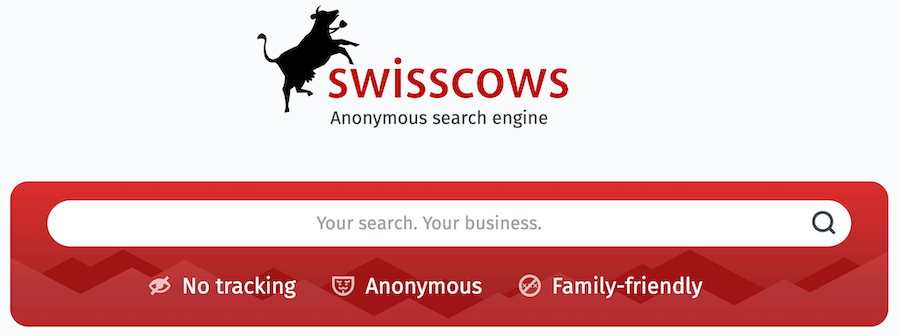
Jurisdiction: Switzerland
Search results: Bing
Swisscows is a Switzerland-based private search engine that does very well with privacy and security. They promise no tracking or data collection, and even have a “Swiss Fort Knox” data center for their server infrastructure. From their website:
- have our own servers and do not work with cloud or third party!
- have our Datacenter in the Swiss Alps – THIS is the safest bunker in Europe!
- have positioned everything geographically outside of EU and US.
In terms of privacy, Swisscows is one of the top choices. You can catch up on their privacy policy here. In testing out Swisscows for this guide, I found it to provide good results, which are primarily sourced from Bing.
Family-Friendly content – One unique aspect of Swisscows is that they are passionate about family-friendly content. As they explain on their about page:
- We promote moral values.
- We hate violence and pornography.
- We promote digital media education.
While some people may not like the fact that Swisscows is censoring some adult content, others may see this as a great feature, especially those who have young children.
Because Swisscows does not pass on user data from search requests, they are unable to effectively monetize their service through ad partners, which means they largely rely on donations and sponsorships to maintain operations (sponsors can get a banner ad at the top of results).
Website: https://swisscows.com
Qwant – A private search engine from France
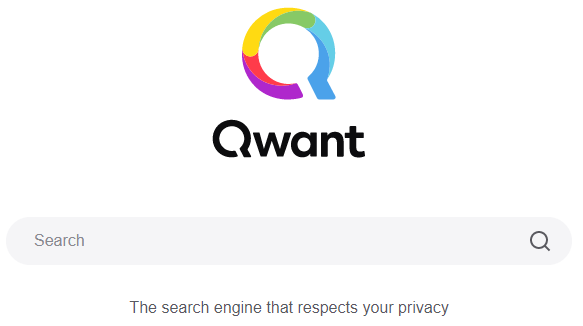
Jurisdiction: France
Search results: Bing
Qwant is a private search engine based in France. Being based in Europe, it is held to data privacy protections that are much stricter than those in the United States and many other countries. Qwant promises to protect user privacy (no tracking) and keep people from getting stuck in the filter bubble.This is all good since Qwant primarily gets its search results from Microsoft’s Bing search engine.
Qwant’s privacy policy has changed since we last reviewed their service. Here’s an excerpt that shows their commitment to protect your privacy:
Qwant is committed to protecting your privacy, and that’s at the heart of our philosophy. What you do with Qwant is your privacy and we don’t want to know about it. We don’t keep your search history and we don’t create an advertising profile to target you. With Qwant, you are of course entitled to the rights guaranteed by the European General Data Protection Regulation of April 27, 2016, known as the “GDPR”, but most importantly, we ensure maximum respect for the principles of data minimization and “privacy by design”, i.e., we implement design methods for our services that allow us to collect and process only the data that is strictly necessary. We never try to find out who you are or what you do personally when you use our search engine.
However, when Qwant does not have the answers to your queries, they will pass along pseudonymous data to Microsoft Ireland Operations Limited. Microsoft provides search results, along with “contextual advertising based on the keywords you entered and your geographic region.”
In addition, for purposes of security and reliability of their partner Microsoft’s services, Qwant “may also collect and transfer to this partner your full IP address.” The data transferred to Microsoft is processed under the rules of article 6.1.f of the GDPR, and may be retained in accordance with Bing’s Privacy Policy for a maximum of 18 months.
While the GDPR should protect your data from abuse by Microsoft, if you don’t want Microsoft to know what you are searching for online, you need to be aware that Qwant may share that information with Microsoft under certain circumstances.
Putting that aside, Qwant has good search filtering options. You can filter results by different categories (web, news, social, images, videos, and shopping) as well as by dates. The Qwant homepage includes news stories, trending people, events, and other interest stories. According to their website, Qwant serves 189 million results per month.
Overall, Qwant is a good option for a private search engine, with many features in place to protect user privacy.
https://www.qwant.com/
DuckDuckGo – Popular private search engine based in the US

Jurisdiction: United States
Search results: Primarily Bing, but there are other sources as well.
DuckDuckGo (a.k.a. DDG) is perhaps the most popular private search engine. It’s popularity has grown greatly since our last review. For many people, the first thing to do when installing a new web browser is to set its default search engine to DuckDuckGo.
Based in the United States (not the ideal location from a privacy perspective), DDG was started by Gabriel Weinberg in 2008. It generates search results from over 400 sources including Wikipedia, Bing, and Yahoo. DuckDuckGo has a close partnership with Yahoo (now owned by Verizon).
In March 2022, DuckDuckGo made two interesting announcements in the wake of the situation with Russia and Ukraine.
- They will censor and “down-rank” search results that they feel are related to “disinformation” — see the Twitter announcement here.
- They will no longer source search results from Yandex, according to reports.
We’re not going to attack DDG for its decision to “down-rank” some websites, because we can see both sides of the argument, and this website is not political. However, we will point out that these actions amount to censorship, which DDG previously denounced with other search engines.
To finance operations, DuckDuckGo generates money through advertisements and affiliate programs, which is explained here. Similar to Google and other search engines, DuckDuckGo will display ads at the top of your searches. DDG has partnered with Amazon and eBay as affiliates.
Searches are saved – DuckDuckGo’s privacy policy reveals that DDG is saving all your search queries:
We also save searches, but again, not in a personally identifiable way, as we do not store IP addresses or unique User agent strings. We use aggregate, non-personal search data to improve things like misspellings.
While it would be great if DDG didn’t save any search information, saving this data without IP addresses or unique User agent strings should protect your privacy just fine.
https://duckduckgo.com
YaCy – The decentralized, open source, peer-to-peer search engine
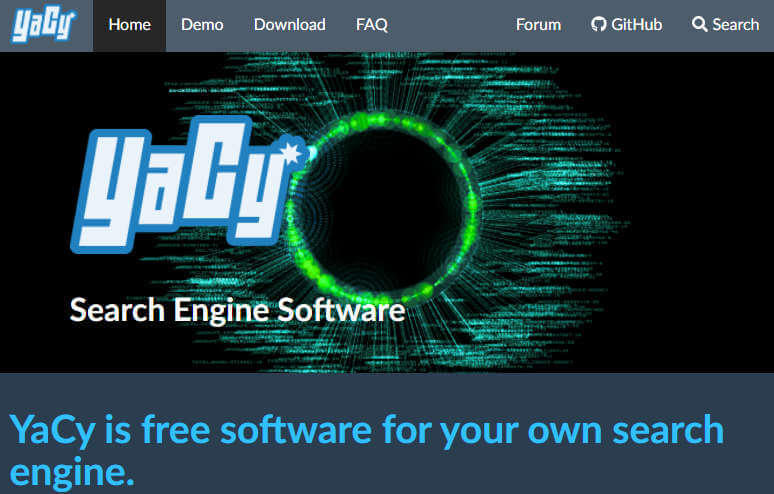
Jurisdiction: Not applicable. (Being a decentralized and open-source platform, YaCy does not appear to fall under any particular jurisdiction, similar to Searx.)
Search results: Peer-to-peer crawler model
YaCy is an open source private search engine created in 2004 by Michael Christen. It can run stand-alone or as part of a decentralized peer-to-peer network. Here is a brief description from YaCy’s website:
It is fully decentralized, all users of the search engine network are equal, the network does not store user search requests and it is not possible for anyone to censor the content of the shared index. We want to achieve freedom of information through a free, distributed web search which is powered by the world’s users.
With YaCy, there is no central server, which could be seized or tapped by authorities. Rather, all peers in the network are equal and can be used for crawling the web or in “proxy mode” to index pages for other users. To use YaCy, you need to download the free software on your operating system, available for Windows, Mac OS, and Linux. There is a demo portal here to test things out.
https://yacy.net/
Ecosia – The search engine that plants trees
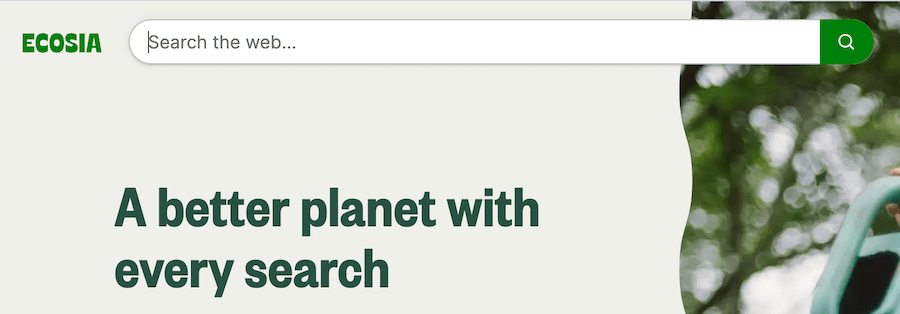
Jurisdiction: Germany
Search results: Bing
Ecosia is a unique private search engine on our list in that it donates a portion of profits to charity and is strictly focused on planting trees. It is based in Germany and claims to be a private search engine. However, some of the things it does make it unsuitable for our main list of truly private search engines.
One issue is that Ecosia collects all search queries and then anonymizes this data after seven days. Another is that they do a fair amount of data collecting through website analytics, including your IP address, browser agent, location, and more.
And one more thing…
Ecosia assigns a Bing tracking ID to every user:
Ecosia also assigns a “Bing Client ID” in order to improve the quality of the search results. This value is a user-specific ID which enables Bing to deliver more relevant search results also based on previous searches. The ID is saved in the Ecosia cookie and retrieved during future visits.
While the “Bing Client ID” can be manually disabled by the user, most people probably are not even aware of it. This is because Ecosia has done a good job burying this information in their privacy policy. To read the full privacy policy, you will need to scroll all the way to the bottom of the privacy page, and then click a light blue “READ MORE” button, which opens up more information.
Does Ecosia meet the criteria to be a “private search engine”? Probably not, but it’s still a good alternative to the big search engines, with commendable charity goals.
Main drawbacks:
- Not a “private search engine” by default
- Bing ID is assigned to users (but can be disabled)
- Search queries, with IP address, are saved for seven days
https://www.ecosia.org/
Yandex.com – A search engine in Russia

Disclaimer: Yandex is a Russian search engine that also engages in censorship, as we see with most Western-based search engines, such as Google and Bing. However, if there is information that you seek, and Western-focused search engines are of no help, then Yandex.com could be a solution for finding what you need. Proceed with caution!
Operating in Russia, we need to point out that Yandex is legally obligated to censor search results. In fact, as we mentioned in our guide on VPNs for Russia, there is massive censorship that is mandated by the government. This is the other side of the censorship coin.
We have also previously pointed out that there is a growing need to unblock websites in Russia given all the censorship lately. In fact, Russia has been actively blocking websites since 2012 and the are now blocking major social media sites, including Facebook and Twitter, as well as international news sites, such as the BBC.
So why discuss Yandex if they also engage in censorship? Answer: If you can’t find what you’re looking for with Western-based search engines, then Yandex may be useful.
https://Yandex.com
Startpage – Private search engine that gives Google and Bing search results
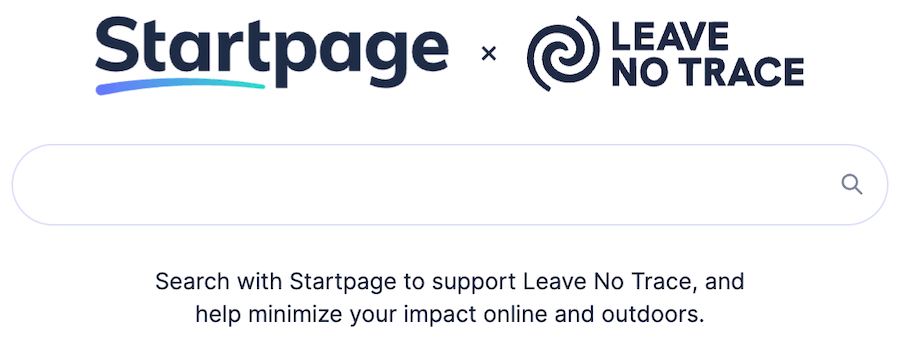
Startpage is a privacy-focused search engine that is gaining recognition for its commitment to protecting user data. Unlike mainstream search engines that track and store user information, Startpage operates on a different principle. It does not collect or share personal data, ensuring that your searches are completely private and anonymous.
Established in 2006 in the Netherlands, Startpage provides search results from Google, which makes it an ideal choice for those who prefer Google’s search results but aren’t comfortable with their tracking practices. Startpage acts as an intermediary between the user and other search engines, removing all identifying information from your query before submitting and returning the results to you.
While Startpage previously relied only on Google for results, it now utilizes both Google and Bing:
For example, Startpage submits your query to Google and Bing anonymously on your behalf, then returns the results to you, privately. Google and Microsoft do not know who made the search request—instead, they only see Startpage.
– Startpage support documentation
In addition to its privacy-focused search, Startpage offers a free proxy service. This allows users to browse websites anonymously by making it appear as though the Startpage servers are visiting the site, not the user’s computer. This feature adds an extra layer of privacy, preventing websites from tracking your IP address or location.
Note: Startpage is now owned by System1, an ad-tech company based in the US.
Jurisdiction: Netherlands (officially, but at least partially owned by a US company)
https://www.startpage.com
Private search engine FAQs
Here are some FAQs (frequently asked questions) with regards to private search engines:
- How do private search engines make money?
- Are US-based search engines safe?
- How to keep your searches private
- Considerations when choosing a private search engine
How do private search engines make money?
Private search engines make money in three ways: contextual advertisements, affiliates, and donations. Let’s examine each of these revenue streams on their own.
1. Contextual advertisements
Just like with Google and Bing, many private search engines make money by placing advertisements in the search results, usually based on the search terms you entered. The difference between private search engines and Google or Bing is that private search engines should only be serving ads based on your search term, rather than from all other data collection sources (email, browsing, etc.).
Note: Some private search engines pass a truncated (anonymized) version of your IP address to the search partner, in order to serve relevant ads for your general location.
2. Affiliate revenue
Many private search engines make money through affiliate programs. DuckDuckGo is an example of this; they are a member of both the Amazon and eBay affiliate programs:
DuckDuckGo is part of the affiliate programs of the eCommerce websites Amazon and eBay. When you visit those sites through DuckDuckGo, including when using !bangs, and subsequently make a purchase, we receive a small commission.
You may also see “online shopping” options above your search results, which are another form of affiliate revenue. Both Qwant and DuckDuckGo use affiliate “shopping” results as sources of income.
Note: When you buy something through an affiliate link, it never increases the price you pay. Rather, it simply transfers a small percentage of the profits (i.e. a commission) to the affiliate, which in this case is the private search engine.
3. Donations
Private search engines may also make money from donations. Anybody can donate to the project, regardless of whether it is an individual developer, a non-profit organization, or a private for-profit business.
If a search engine does not have other sources of revenue or good advertising deals with partners, donations become very important to ensure continued operations. For example, Swisscows, MetaGer, and YaCy all have donation options.
Are US-based search engines safe?
Choosing a private search engine is all based on your unique needs and threat model. Therefore a private search engine that Bob considers to be safe, may not be adequate for Alice.
With regards to US-based search engines, and any other US businesses that handles (or has potential access) to private data, there are a few things to keep in mind:
- The United States has extensive surveillance programs, which are carried out by various branches of government, such as the NSA.
- The US has a long history of working with (and forcing) private tech companies to facilitate bulk data collection efforts – see the PRISM program for details. (This raises questions about private search engines that are being hosted on Amazon infrastructure, a large US-based company.)
- US companies could be served National Security Letters or other lawful data collection demands, while also being prohibited from disclosing this due to gag orders.
These laws and capabilities essentially give the US government the authority to compel a legitimate privacy-focused company to function as a data collection tool for state agencies.

If a privacy-focused business were to be compromised, it would likely happen behind closed doors, without a word (or warning) to the users. This was the case with Lavabit, and rather than comply with the data requests, the founder was basically forced to shut down the business.
As a general rule, RestorePrivacy does not recommend services that are based in the US. Nonetheless, it all depends on your threat model and how much privacy and security you need.
How to keep your searches private
Here are five basic tips for keeping your searches (and data in general) more private.
1. Use a private search engine
Using one of the private search engines in this guide will help keep your data safe from third parties. See the reviews to determine which private search engine best suits your needs.
2. Use a private and secure browser
Just like with search engines, your browser can also reveal lots of private information about you to third parties:
- Browsing history: all the websites you visit
- Login credentials: usernames and passwords
- Cookies and trackers: these are placed on your browser by the sites you visit
- Autofill information: names, addresses, phone numbers, etc.
- Metadata, which can be used for tracking and identification (browser fingerprinting)
Many of the private search engines in this guide offer browser extensions to replace the default search engine for your browser. DuckDuckGo has even become listed as an alternative search engine for browsers like Firefox and Google Chrome.
See our guide on secure browsers here.
3. Use a good VPN service
If you use a good VPN service, you won’t have to worry about search engines logging your IP address and location. A VPN will encrypt your traffic for safe transit across the internet, while also replacing your IP address and location with that of the VPN server you’re connected to. There are many other uses for VPN services and they are an important privacy tool, especially since internet providers in many countries are now collecting browsing history.
Below are my top VPN recommendations:
- NordVPN: A fast, secure, audited VPN with advanced privacy features and a strict no-logs policy, based in Panama (with a 74% discount coupon).
- Surfshark VPN: A no-logs VPN service with a large lineup of privacy and security features, based in The Netherlands.
- ExpressVPN – A reliable, secure, and user-friendly VPN service that is based in the British Virgin Islands with a no-logs policy (audited twice).
And you can get more information on our top recommendations of the best VPN services here. Our ExpressVPN vs NordVPN comparison also examines these two top services in back-to-back tests.
4. Use a good ad blocker
A reliable ad blocker is another important privacy tool since ads have become a major threat to your privacy. Many ads now quietly collect data for third-party advertising networks. Other ads (known as malvertising), actually install malware on your computer or mobile device. The best thing to do these days is to simply block ads and tracking networks.
There are of course many other privacy tools to consider. However, a good private search engine, a secure browser, a reliable VPN, and a safe ad blocker are the top priorities for basic digital self defense.
5. Log out!
Lastly, whenever possible, stay logged out of Big Tech accounts (Gmail, YouTube, Amazon, etc.) when surfing the web, since their trackers will record your browsing activity and link this to your data profile.
Another option is to use one browser for staying logged into various accounts, but then use a separate browser for general browsing activity (this is known as browser compartmentalization).
Important considerations for choosing the best private search engine
Here are some things to consider when looking for the best search engine for privacy:
- Search results – Some search engines may do well in the privacy category, but they don’t return very good results. Some will actively engage in censorship, or display censored search results from Google or Bing.
- Privacy – Consider what information the search engine is logging, as well as the data that may be passed off to third parties and search partners (such as Bing).
- Jurisdiction – Jurisdiction is an important factor to consider because it ultimately affects your data and privacy. Services based in the US, for example, are subject to the Patriot Act, National Security Letters, and may also be forced to collect user data without being allowed to disclose anything (due to gag orders).
- Features – Some private search engines offer useful features, such as anonymous viewing (via proxy servers), search result filtering options, plugins, extensions, and more.
- Mobile apps – More than a year ago, Google reported that they process more search requests from mobile devices than they do from desktops. We live on our mobile devices, so a search engine that offers a mobile app for your specific device could be a big benefit.
- Trust – Trust is difficult to quantify and measure, but it’s a very important consideration. When considering the trust factor, you may want to look at the history of the company and the individuals behind it.
Finding the best search engine for your needs is a subjective process, and there’s no single “best private search engine” that applies to everyone. Check out our reviews, the test drive a few different options to find the best fit for you.
This private search engines guide was last updated on April 26, 2024.

Leave a Reply